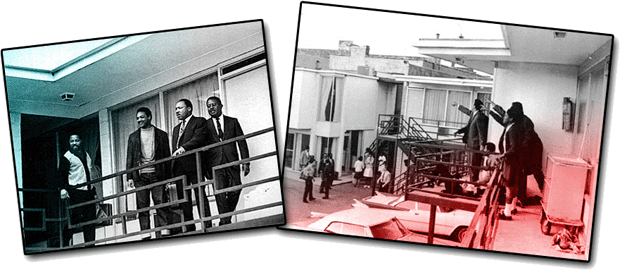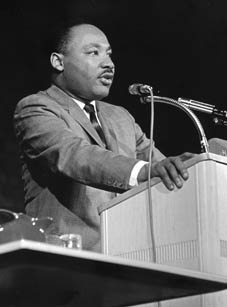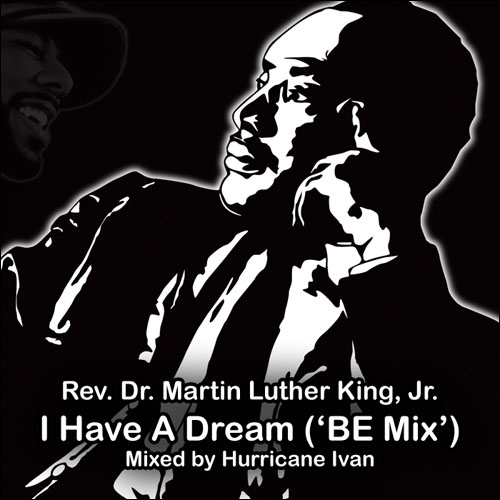
Today marks the 40th year since the passing of Dr. Martin Luther King, Jr. Taken at such a young age (only 39), Dr. King nonetheless left behind an extensive legacy. Known best perhaps for his "I Have a Dream" speech, King was much more than a dreamer. He was a democrat (lower case 'd') who believed in the power of protest and the capability/ies of a movement, armed and powerful with a strong-willed message: a message of love. King's passing left many disillusioned, plummeting into levels of despair and resentment, much of which exists to this very day. One would be hard-pressed to find another luminary since King who evoked his same eloquence and commanding leadership qualities.
Professor Cornel West often comments on the 'Santa Clausification' of Dr. King, a desensitization of the social leader's true voice and message. To many, his "I Have a Dream" speech is nothing more than a catchy string of rhetoric and wordplay. But by digging deeper into his speech(es), one can draw much more from this starry-eyed dreamer. Dr. King cut to the heart of the subject with fierce urgency and candor:
 Granted, I'm not drawing a particular comparison to the late and great Dr. King to any specific emcees. What I am saying, however, is that there is a stark similarity between the two forms of communication. Rap music, typically identified as sheer materialism sprinkled with drugs, misogyny and violence, all too often forfeits the shine of its true artists at the hands of its stereotypes and worst-case-scenarios. There's no denying that great emcees like Tupac Shakur, KRS-One, Chuck D, Immortal Technique and countless others all speak truth to power: with raw tenacity and, as King put it, "the fierce urgency of now!"
Granted, I'm not drawing a particular comparison to the late and great Dr. King to any specific emcees. What I am saying, however, is that there is a stark similarity between the two forms of communication. Rap music, typically identified as sheer materialism sprinkled with drugs, misogyny and violence, all too often forfeits the shine of its true artists at the hands of its stereotypes and worst-case-scenarios. There's no denying that great emcees like Tupac Shakur, KRS-One, Chuck D, Immortal Technique and countless others all speak truth to power: with raw tenacity and, as King put it, "the fierce urgency of now!"
Nonetheless, rap music as a whole remains characterized as mere wordplay with no substance. Quite a shame... But instead of sitting back and allowing the culture to get monopolized and manipulated by the same self-destructiveness we've seen all these years, let's rise up and change it. Once again, to quote King:

In 2007, I whipped up a remix/blend of Dr. King's FULL 'I Have a Dream' speech, aside the instrumentals from Common's 2005 classic BE (one of my most-played albums of all-time). The result was a soulful mixture of inspiration and great Hip-Hop music production. I've re-uploaded it for you all to listen to. Enjoy:

DOWNLOAD:
Dr. Martin Luther King, Jr. - I Have A Dream (Hurricane Ivan's BE Mix)
...FULL TEXT HERE...
Also, Michael Eric Dyson and Cornel West will both be on Tavis Smiley's show on PBS tonight(!!!) to discuss Dr. King's legacy. Check your local listings and stay tuned!
Professor Cornel West often comments on the 'Santa Clausification' of Dr. King, a desensitization of the social leader's true voice and message. To many, his "I Have a Dream" speech is nothing more than a catchy string of rhetoric and wordplay. But by digging deeper into his speech(es), one can draw much more from this starry-eyed dreamer. Dr. King cut to the heart of the subject with fierce urgency and candor:
It would be fatal for the nation to overlook the urgency of the moment. This sweltering summer of the Negro's legitimate discontent will not pass until there is an invigorating autumn of freedom and equality. Nineteen sixty-three is not an end, but a beginning. And those who hope that the Negro needed to blow off steam and will now be content will have a rude awakening if the nation returns to business as usual. And there will be neither rest nor tranquility in America until the Negro is granted his citizenship rights. The whirlwinds of revolt will continue to shake the foundations of our nation until the bright day of justice emerges.Unlike others, however, King also sought to build bridges, rather than burn them:
...
There are those who are asking the devotees of civil rights, "When will you be satisfied?" We can never be satisfied as long as the Negro is the victim of the unspeakable horrors of police brutality. We can never be satisfied as long as our bodies, heavy with the fatigue of travel, cannot gain lodging in the motels of the highways and the hotels of the cities. *We cannot be satisfied as long as the negro's basic mobility is from a smaller ghetto to a larger one. We can never be satisfied as long as our children are stripped of their self-hood and robbed of their dignity by a sign stating: "For Whites Only."* We cannot be satisfied as long as a Negro in Mississippi cannot vote and a Negro in New York believes he has nothing for which to vote. No, no, we are not satisfied, and we will not be satisfied until "justice rolls down like waters, and righteousness like a mighty stream."
The marvelous new militancy which has engulfed the Negro community must not lead us to a distrust of all white people, for many of our white brothers, as evidenced by their presence here today, have come to realize that their destiny is tied up with our destiny. And they have come to realize that their freedom is inextricably bound to our freedom.As I stated previously, King's speech and speeches often get buried under the 'Dream brand', but it's deeper than it appears to be. Dare I say the same about Hip-Hop and rap music?
We cannot walk alone. And as we walk, we must make the pledge that we shall always march ahead. We cannot turn back...
 Granted, I'm not drawing a particular comparison to the late and great Dr. King to any specific emcees. What I am saying, however, is that there is a stark similarity between the two forms of communication. Rap music, typically identified as sheer materialism sprinkled with drugs, misogyny and violence, all too often forfeits the shine of its true artists at the hands of its stereotypes and worst-case-scenarios. There's no denying that great emcees like Tupac Shakur, KRS-One, Chuck D, Immortal Technique and countless others all speak truth to power: with raw tenacity and, as King put it, "the fierce urgency of now!"
Granted, I'm not drawing a particular comparison to the late and great Dr. King to any specific emcees. What I am saying, however, is that there is a stark similarity between the two forms of communication. Rap music, typically identified as sheer materialism sprinkled with drugs, misogyny and violence, all too often forfeits the shine of its true artists at the hands of its stereotypes and worst-case-scenarios. There's no denying that great emcees like Tupac Shakur, KRS-One, Chuck D, Immortal Technique and countless others all speak truth to power: with raw tenacity and, as King put it, "the fierce urgency of now!"Nonetheless, rap music as a whole remains characterized as mere wordplay with no substance. Quite a shame... But instead of sitting back and allowing the culture to get monopolized and manipulated by the same self-destructiveness we've seen all these years, let's rise up and change it. Once again, to quote King:
Let us not wallow in the valley of despair, I say to you today, my friends. And so even though we face the difficulties of today and tomorrow, I still have a dream.Emcees and all music fans looking for some inspiration should look no further than King himself. By definition, an emcee is a Master of Ceremony, and King could truly Move a Crowd! Let's take this day to remember King's legacy, as well as the possibilities it's still able to foster in these grueling times. King's still talking to us... Long Live the King!
In 2007, I whipped up a remix/blend of Dr. King's FULL 'I Have a Dream' speech, aside the instrumentals from Common's 2005 classic BE (one of my most-played albums of all-time). The result was a soulful mixture of inspiration and great Hip-Hop music production. I've re-uploaded it for you all to listen to. Enjoy:

DOWNLOAD:
Dr. Martin Luther King, Jr. - I Have A Dream (Hurricane Ivan's BE Mix)
...FULL TEXT HERE...
Also, Michael Eric Dyson and Cornel West will both be on Tavis Smiley's show on PBS tonight(!!!) to discuss Dr. King's legacy. Check your local listings and stay tuned!
P.S. Sorry if the post came off as a bit 'preachy' ;-P
P.P.S. Check out this new KRS-One interview. He briefly discusses King's vision for the world (at around 05:00):
